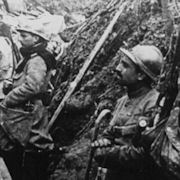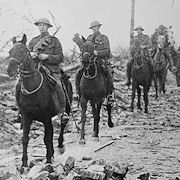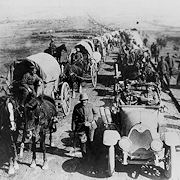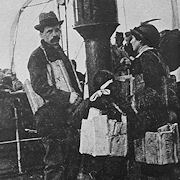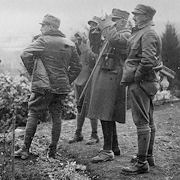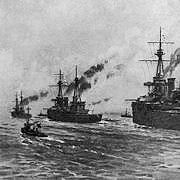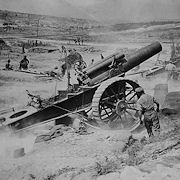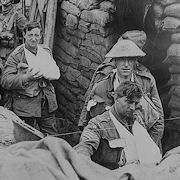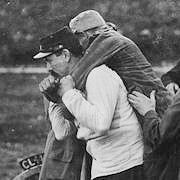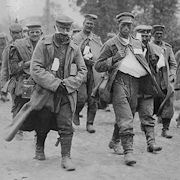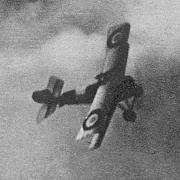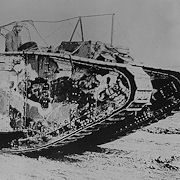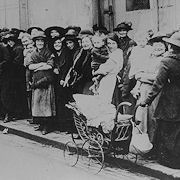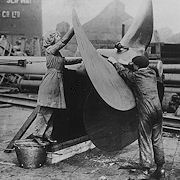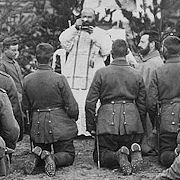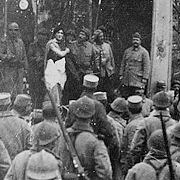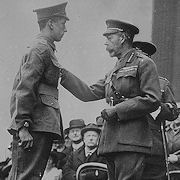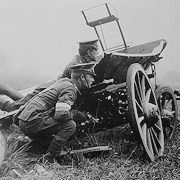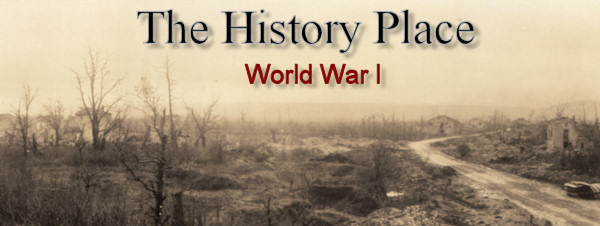
1916 : The Blood Letting
January 1916 - President Woodrow Wilson begins an effort to organize a peace conference in Europe. February 18, 1916 - In West Africa, the German colony of Cameroon falls to the French and British following 17 months of fighting. This leaves only one German colony remaining in Africa, known as German East Africa. There, 10,000 troops skillfully commanded by General Paul von Lettow-Vorbeck prove to be an elusive but deadly target, as they are pursued by a British-led force ten times larger. Battle of Verdun February 21, 1916 - On the Western Front, the German 5th Army attacks the French 2nd Army north of the historic city of Verdun, following a nine-hour artillery bombardment. The Germans under Chief of the General Staff, Erich Falkenhayn, seek to "bleed" the French Army to death by targeting the cherished city. At first, the Germans make rapid gains along the east bank of the Meuse River, overrunning bombed out French trenches, and capture lightly defended Fort Douaumont four days later without firing a shot. However, the German offensive soon stalls as the French rush in massive reinforcements and strengthen their defenses, under the new command of Henri Petain, who is determined to save Verdun. An early spring thaw also turns the entire battlefield into mud, hampering offensive maneuvers. March 6, 1916 - Germans renew their Verdun offensive, this time attacking along the west bank of the Meuse River, targeting two strategic hills northwest of Verdun that form the main French position. However, by the end of March, the heavily defended hills are only partially in German hands. March 18, 1916 - On the Eastern Front, the Russians oblige a French request to wage an offensive to divert German resources from Verdun. Although the Russians greatly outnumber the Germans in the northern sector of the Eastern Front, their poorly coordinated offensive around Vilna and at Lake Naroch is swiftly defeated by the Germans with 70,000 Russian casualties. April 9, 1916 - The Germans attack again at Verdun, now along a 20-mile-wide front on both the east and west banks of the Meuse River. Once again the attack only yields partial gains in the face of stiff French resistance. April 18, 1916 - President Woodrow Wilson threatens to sever diplomatic ties between the United States and Germany following the sinking of the passenger ferry Sussex by a U-Boat in the English Channel. The attack marked the beginning of a new U-Boat campaign around the British Isles. But in response to Wilson, the Germans call off the U-Boats. April 29, 1916 - In the Middle East, the five-month siege at Kut-al-Amara in Mesopotamia ends as 13,000 British and Indian soldiers, now on the verge of starvation, surrender to the Turks. The largest-ever surrender by the British Army comes after four failed attempts by British relief troops to break through to the surrounded garrison. May 3, 1916 - At Verdun, the Germans begin another attack on the west bank of the Meuse. This time they gain the advantage and within three days capture the two French hills they had been striving for since early March, thus achieving a solid position northwest of Verdun. May 15, 1916 - Austrian troops attack Italian mountain positions in the Trentino. The Italians withdraw southward, forcing the Austrians to stretch their supply lines over the difficult terrain. The arrival of Italian reinforcements and a successful counter-attack then halts the Austrian offensive completely. May 25, 1916 - The era of the all-volunteer British Army ends as universal conscription takes effect requiring all eligible British men between the ages of 19 and 40 to report, excluding men working in agriculture, mining or the railroads. Battle of Jutland May 31, 1916 - The main German and British naval fleets clash in the Battle of Jutland in the North Sea, as both sides try, but fail, to score a decisive victory. Forward battle cruisers from the British Grand Fleet are initially lured southward toward the German High Seas Fleet, but then turn completely around, luring the entire German fleet northward. As they get near, the British blast away at the German forward ships. The Germans return fire and the two fleets fire furiously at each other. However, the Germans, aware they are outgunned by the larger British fleet, disengage by abruptly turning away. In the dead of the night the Germans withdraw entirely. The British do not risk a pursuit and instead head home. Both sides claim victory. Although the Germans sink 14 of the 151 British ships while losing 11 of 99 ships, the British Navy retains its dominance of the North Sea and the naval blockade of Germany will remain intact for the war's duration. June 1, 1916 - Germans at Verdun try to continue their offensive success along the Meuse River and now attack the French on the east bank, targeting Fort Vaux and the fortification at Thiaumont. Eight days later, both objectives are taken as the French suffer heavy casualties. The Germans now push onward toward a ridge that overlooks Verdun and edge toward the Meuse bridges. The entire nation of France now rallies behind their troops in the defense of Verdun as French generals vow it will not be taken. June 4, 1916 - Four Russian armies on the Eastern Front, under their innovative new commander, General Alexei Brusilov, begin a general offensive in the southwest along a 300-mile front. Brusilov avoids the style of predictable narrow frontline attacks used previously, in favor of a sweeping offensive over hundreds of miles that is harder to pin down. Thinly stretched Austro-Hungarian troops defending this portion of the Front are taken by surprise. Realizing their distress, the Germans pull four divisions from Verdun and send them east. By the end of summer, the Germans will send 20 more divisions and merge the surviving Austro-Hungarian troops into the Germany Army. June 22, 1916 - Germans resume their offensive near Verdun, targeting Fort Souville which overlooks the city and the Meuse bridges. Using poisonous phosgene gas at the start of the attack, they initially take the village of Fleury just two miles north of Verdun, but further advance southward is halted by a strong French counter-attack. Verdun has now become a battle of attrition for both sides with a death toll already approaching 500,000 men. Battle of the Somme June 24, 1916 - The Allies begin a week-long artillery bombardment of German defensive positions on the Somme River in northern France, in preparation for a major British-led offensive. Over 1.5 million shells are fired along a 15-mile front to pulverize the intricate German trench system and to blow apart rows of barbed wire protecting the trenches. British Commander Douglas Haig believes this will allow an unhindered infantry advance and a rapid breakthrough of the German Front on the first day of battle. July 1, 1916 - The British Army suffers the worst single-day death toll in its history as 18,800 soldiers are killed on the first day of the Battle of the Somme. The losses come as 13 attacking divisions encounter German defenses that are still intact despite the seven-day bombardment designed to knock them out. The British also attack in broad daylight, advancing in lines shoulder-to-shoulder only to be systematically mowed down by German machine-gunners. The Somme offensive quickly becomes a battle of attrition as British and French troops make marginal gains against the Germans but repeatedly fail to break through the entire Front as planned. July 10, 1916 - The Germans attack again at Verdun, using poison gas, and advance toward Fort Souville. Four days later, the French counter-attack and halt the Germans. July 13, 1916 - The British launch a night attack against German positions along a 3.5-mile portion of the Somme Front. After advancing nearly 1,000 yards, the advance is halted as the Germans regroup their defenses. Two days later, the British once again penetrate the German line and advance to High Wood but are then pushed back. August 27, 1916 - Romania declares war on the Central Powers and begins an invasion of Austria-Hungary through the Carpathian Mountains. The Romanians face little opposition initially and advance 50 miles into Transylvania. August 28, 1916 - Kaiser Wilhelm appoints Field Marshal Paul von Hindenburg as Germany's new Chief of the General Staff, replacing Erich Falkenhayn following the disappointment at Verdun and recent setbacks on the Eastern Front. August 28, 1916 - Italy declares war on Germany, thus expanding the scope of its military activities beyond the Italian-Austrian Front. August 29, 1916 - Germany's entire economy is placed under the Hindenburg Plan allowing the military to exercise dictatorial-style powers to control the labor force, munitions production, food distribution and most aspects of daily life. September 1, 1916 - Romania is invaded by the newly formed Danube Army, consisting of Germans, Turks and Bulgarians under the command of German General August von Mackensen. This marks the start of a multi-pronged invasion of Romania in response to its aggression against Austria-Hungary. September 15, 1916 - The first-ever appearance of tanks on a battlefield occurs as British troops renew the Somme offensive and attack German positions along a five-mile front, advancing 2,000 yards with tank support. The British-developed tanks feature two small side-cannons and four machine-guns, operated by an eight-man crew. As the infantry advances, individual tanks provide support by blasting and rolling over the German barbed wire, piercing the frontline defense, and then roll along the length of the trench, raking the German soldiers with machine-gun fire. September 20, 1916 - On the Eastern Front, the Brusilov Offensive grinds to a halt. Since its launch in early June, four Russian armies under the command of General Alexei Brusilov had swept eastward up to 60 miles deep along a 300-mile front while capturing 350,000 Austro-Hungarian troops. But by the end of summer, the Germans brought in 24 divisions from the Western Front and placed the surviving Austro-Hungarian troops under German command. The Russian attack withered after the loss of nearly a million men amid insufficient reserves. The humiliating withdrawal from the hard-won areas wrecks Russian troop morale, fueling political and social unrest in Russia. September 25, 1916 - British and French troops renew their attacks in the Somme, capturing several villages north of the Somme River, including Thiepval, where the British successfully use tanks again. Following these successes, however, heavy rain turns the entire battlefield to mud, preventing effective maneuvers. October 8, 1916 - The German Air Force (Luftstreikrafte) is founded as various aerial fighting groups are merged. October 10, 1916 - Romanian troops return home after being pushed out of Hungary by two Austro-German armies. The Austro-German 9th Army then invades Romania and heads toward Bucharest. October 24, 1916 - At Verdun, the French under General Robert Nivelle, begin an ambitious offensive designed to end the German threat there by targeting Fort Douaumont and other German-occupied sites on the east bank of the Meuse River. The attack is preceded by the heaviest artillery bombardment to-date by the French. Additionally, French infantry use an effective new tactic in which they slowly advance in stages, step-by-step behind encroaching waves of artillery fire. Using this creeping barrage tactic, they seize Fort Douaumont, then take Fort Vaux further east, nine days later. November 7, 1916 - American voters re-elect President Woodrow Wilson who had campaigned on the slogan, "He kept us out of war." November 13, 1916 - British troops stage a surprise attack and capture the towns of Beaumont Hamel and Beaucourt at the northern end of the Somme Front. November 18, 1916 - The Battle of the Somme ends upon the first snowfall as the British and French decide to cease the offensive. By now, the Germans have been pushed back just a few miles along the entire 15-mile front, but the major breakthrough the Allies had planned never occurred. Both sides each suffered over 600,000 casualties during the five-month battle. Among the injured German soldiers is Corporal Adolf Hitler, wounded by shrapnel. November 20, 1916 - Emperor Franz Joseph of Austria-Hungary dies at age 86. He is succeeded by Archduke Charles who wants to take Austria-Hungary out of the war. December 6, 1916 - Bucharest, capital of Romania, falls to the Austro-Germans. This effectively ends Romanian resistance to the Austro-German invasion and places the country's entire agricultural and industrial resources, including the Ploesti oil fields, in German hands. December 7, 1916 - LLoyd George becomes Britain's new Prime Minister. His new War Cabinet immediately begins to organize the country for "total war." December 12, 1916 - Joseph Joffre resigns under pressure from his position as Commander-in-Chief of the French Army, replaced by General Robert Nivelle. December 15, 1916 - The last offensive in the Battle of Verdun begins as the French push the Germans out of Louvemont and Bezonvaux on the east bank of the Meuse River. Combined with other ground losses, the German withdrawal ends the immediate threat to Verdun and both sides now focus their efforts on battles elsewhere along the Western Front. Overall, the French and Germans suffered nearly a million casualties combined during the ten month battle in which the Germans failed to capture the city of Verdun. December 18, 1916 - President Woodrow Wilson caps off a year-long effort to organize a peace conference in Europe by asking the combatants to outline their peace terms. NEXT SECTION - World War I 1917 - The Rage of Men |
|
[ The History Place Main Page | American Revolution | Abraham Lincoln | U.S. Civil War | Child Labor in America 1908-1912 | John F. Kennedy Photo History | Vietnam War | The Rise of Adolf Hitler | Triumph of Hitler | Defeat of Hitler | Hitler Youth | Timeline of World War II in Europe | Holocaust Timeline | Irish Potato Famine | Photo of the Week | This Month in History | History Videos | Hollywood's Best History Movies | Send Feedback ]
Copyright © 2009 The History Place™ All Rights Reserved
Terms of use: Private home/school non-commercial, non-Internet re-usage only is allowed of any text, graphics, photos, audio clips, other electronic files or materials from The History Place.
